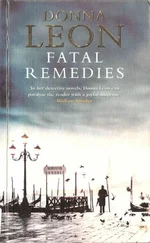Signor Bear opened the wine and poured his wife, and then himself, a glass. Caterina found that an excellent idea and went to the refrigerator and poured herself some Ribolla Gialla. The aria that came from the computer was, she thought, the lament by King Anfione, the father of the slaughtered children, sung by a countertenor whose voice she did not recognize.
Across the calle, Signor Bear turned to his son and slowly ruffled his hair, letting his hand linger at the base of the boy’s skull for a second before returning to his fork. The singer’s voice, accompanied minimally by lute and violins, sang to Caterina of the future, of his pianti, dolor, e tormenti . Did Signor Bear ever lie awake at night and worry about the safety of his children the way her parents, she knew, had worried about them? Did he have always at one step from him the fear of il mio dolor ? Her father was a teacher, Anfione a king, and Signor Bear? What did he do to bring home the honey for his wife and babies? Did it matter? Grief was the great leveler.
The rhythm changed and Anfione was calling his troops all’armi . Almost by magic, as if the Bears had the music playing in their home, the son stabbed his fork at the food on his plate, glanced at his father for approval, waved a forkful of what looked like pieces of short pasta in the air a few times, and then, in perfect rhythm with the battle cry of the king, popped it into his mouth. Caterina laughed out loud and took another sip of her wine.
The young daughter, who sat opposite her brother, shot him a glance, the look every little sister gave to the older brother who got all of the attention. And love? Her face was a study in a child’s version of tragedy, while from the computer the same voice announced “ Dell’alma stanca ,” and, indeed, the little girl, in the manner of little girls, looked as though her soul were tired and dejected and abandoned. But then, just as the voice referred to placidi respiri, the father leaned toward her, then leaned closer still, and kissed her cheek. Her glance as she turned toward her father was so filled with joy that Caterina turned from it, telling herself it was time to check the zucchini.
By the time she took her dinner and another glass of wine back to the table, the Bears had finished their dinner and left the kitchen. Caterina, reluctant to read, turned her mind from the idea of children and considered, instead, the men, historical and actual, she had encountered since she came back to Venice. Her thoughts did not follow the chronological order in which she had encountered them. Her speculations jumped from one to another, then leaped ahead three centuries, drawn by similarities among them: their effect on women, their loyalty to friends or causes, the seriousness of their desires.
At the end of considerable reflection, and to her considerable surprise, she discovered that Steffani was the man she found most interesting, although she failed utterly to form any clear sense of him or feel any emotion save pity. A priest, a proselytizer, probably a spy for the Vatican, Steffani was all of these things, and all of them were things she was historically preconditioned to dislike. At the same time, she had found no evidence that Steffani had betrayed anyone, nor that he had suggested the burning of heretics. And he had written that music, the strains of which still haunted her.
As she washed and dried the dishes, she continued to think about him. He had been an insider, reared in the Vatican and familiar with the workings of Propaganda Fide. He knew what they were and worked to bring other people under their power. She stopped, a cotton towel running around the rim of her wineglass, realizing that she still had no idea of whether Steffani believed it all or not. Was he a man of his era, as opportunistic as the next, using the Church as a means to accumulate power and hoping to convert people only to build up numbers? Or did he believe it all and want others to find the same salvation in faith he believed he might have found? Nothing she had read about him allowed her to decide. Was the Stabat Mater an example of glowing faith or an example of musical genius?
The next morning Caterina was at the Foundation at nine, bent on getting to work on the papers in the second trunk. She paused as she closed the door to the building, drawn as if by the music of Parnassus itself, to the sound coming from Roseanna’s office. Indeed, as she arrived at the open door, she found what she expected: Roseanna was typing. Click and clack and then whir and slam and click, click-click, thud, click-click .
She knocked on the side of the door, and Roseanna looked up, smiling when she saw her. “Want to try?” she said and laughed.
Caterina shook her head as at the sight of mystery. “No, thanks. But I would like you to give me a hand.”
Without asking what it might be, Roseanna abandoned her task and got to her feet. “Gladly.”
“Upstairs. The trunks,” Caterina said. “I want to start on the papers in the second, but I don’t want to have to lean over the first every time I have to get into it. Maybe you’d help me move them?”
“Good idea,” Roseanna said. “Backs are terrible. You’re sure to do something to yours if you keep leaning over to get at the papers, especially when you get to the bottom of the piles.”
Talking about bad backs and the people they knew who had them, the two women went upstairs to the director’s office. Caterina unlocked the door and let them in and was surprised to find the room warm, almost uncomfortably so. She looked around in search of the source, her mind flashing to the possibility of fire. Roseanna put her unease at rest by going over to open one of the windows and swing back the shutters, allowing the sun to flood into the room; cool spring air and birdsong entered with it. “At last,” Roseanna said with palpable relief. She opened the other window and left them both open.
Caterina delighted in the fresh air and rejoiced in the sound. She unlocked the cabinet and pulled the doors open wide. For a moment, the women stood in front of the trunks, discussing the best way to move the first so as most easily to create access to the second.
When it was agreed, they each took a handle and carried the first trunk forward a meter or so, lowering it slowly to the parquet floor. They did the same with the second, which weighed more, and set it to the left of the other. Without having to discuss it, they lifted the first one and replaced it in the back of the storeroom, where the other had been, then put the other in front of it.
“Thanks,” Caterina said. Then, “Curious?”
Roseanna, who had not had a clear view of the papers when the trunks were first opened, said that she was but remained at a polite distance, as if to acknowledge Caterina’s right to open the trunk.
Caterina did just that, leaned over to peer inside, and saw that the papers had shifted around so as no longer to be separable into piles. Indeed, a few sheets of paper had worked themselves loose and now lay vertically between the other piles. Thinking as a researcher, she realized that this would create a problem of chronology among any papers that were not dated and began to plan how to remove them systematically so as to maintain the order into which they had shifted themselves.
Perhaps the best thing to do was to remove the loose papers and then slip her hand in at the place where the two separate piles had once met and feel if the intermingling of papers extended all the way to the bottom of the trunk.
She crouched next to the trunk and leaned over the edge, propping her weight on her right hand as she leaned forward. She slipped her left hand inside at the point where the two stacks of papers must once have met. She slid it down, the papers rubbing against her palm. She moved her hand slowly, hoping to find a place where the stacks were still separated.
Читать дальше












